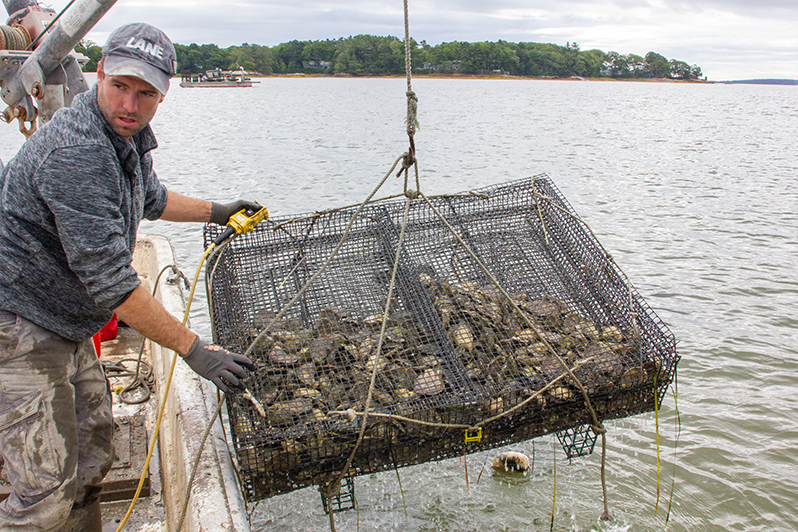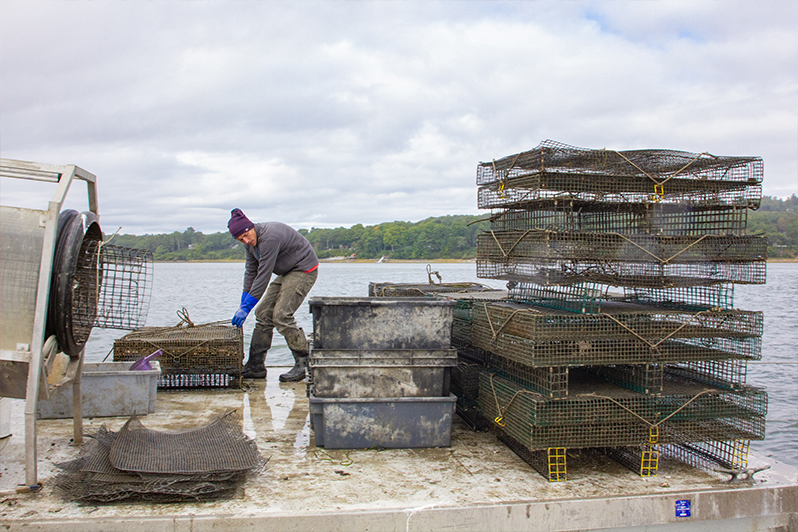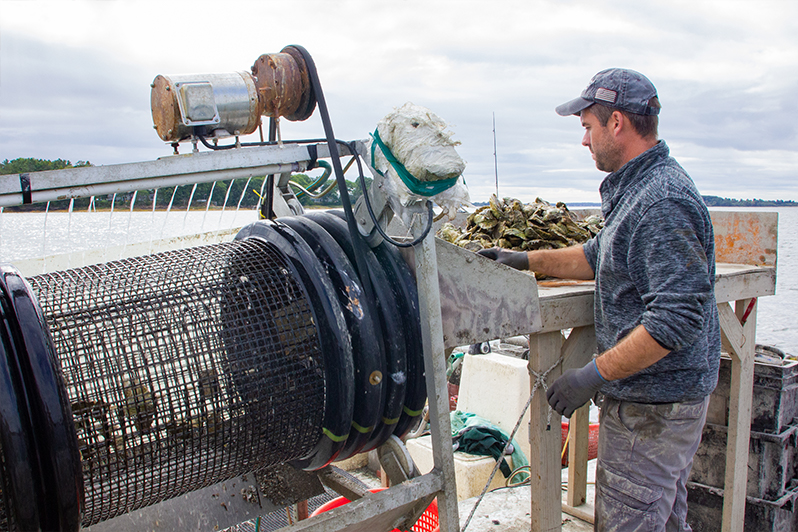BACKGROUND
Mark Green got into aquaculture because of his time spent in labs working with shellfish on ocean acidification research. While he enjoyed the scientific process, one of his favorite parts of the job was the husbandry related to taking care of his specimens—feeding them, cleaning them, and making sure they were healthy for his research. This led to him eventually starting Basket Island Oyster Company. What started as a small scale operation grew into an operation that sold 250,000 oysters in 2019. His goal is to reach 1,000,000 oysters, and to do that, Basket Island will need to expand their market.
Listen to Mark discuss how he got started with his aquaculture operation and the current state of the oyster market in Maine…
While Maine has some of the best waters for growing oysters, it grows relatively few oysters when compared to other coastal states in the US. (For reference, Rhode Island has a coastline that’s one tenth the size of Maine’s but grows about the same quantity of oysters)
Maine also has a finite market, as it’s one of the least populated states in the nation. Portland is one of the primary destinations for oysters grown in Maine and there is a risk of the market softening as an increasing number of individuals start their own oyster farms. It was this risk that coaxed Mark Green into seeking a market outside of the state not only to ensure the growth of Basket Island Oyster Company, but in an effort to make Maine’s entire oyster market more resilient. With only a handful of wholesale buyers available within the state, Maine risks the potential of the price per oyster dropping as the supply grows. While there are complications that come with expanding the oyster market outside of Maine, thankfully, there are also advantages.
Farm manager, Lane Hubacz, operates the oyster tumbler.
CHALLENGES
There are always challenges that accompany oyster farming. Mark can attest to that himself having once lost his entire harvest to 5 feet of surface ice. Another one of his harvests was decimated by starfish. Challenges also exist when it comes to expanding one’s market. An aquaculturist needs proper certification in order to ship their product. Proper certification means infrastructure, and infrastructure means capital investment. The mission is to attain Hazard Analysis and Critical Control Point—or HACCP certification. This requires infrastructure such as a walk-in cooler and stainless-steel tables and sinks.
If an aquaculturist invests in the infrastructure necessary to become legally certified to ship their shellfish, then there still is the issue of making contact with out-of-state buyers and getting the oyster on someone’s plate miles from where it was grown.
THE SOLUTIONS
Mark and his team simply sought out restaurants that had oysters on their menus, and cold called them. Before long, they were sending samples to high-end restaurants across the country. Oysters have a similar appeal to other “craft” products. Just like with wine or craft beer, connoisseurs in any city are excited to try new varieties. Basket Island works directly with several restaurants as far away as Houston, as Maine seafood is always a desirable thing for any restaurant’s menu. Mark Green emphasized the importance of the Maine brand:
“Maine conjures up this image… the American lobster, it’s the tasty seafood, it’s cod fish, it’s the rocky intertidal, it’s mussels, it’s soft shell clams, and oysters will be a part of that equation moving forward… Maine will always be recognized for its seafood. So as long as we can establish a market, we’ll have a place for oysters to go.”
-Mark Green, Basket Island Oyster Company
Not only does Maine’s historical reputation of quality seafood serve as an advantage; the existing seafood infrastructure does as well. Maine lobster is shipped all over the world, and the lobster industry already has facilities that accommodate the transportation of other shellfish like oysters. Mark believes that by teaming up with lobster distribution, the exportation of oysters could lower costs for both industries.
Mark and his team bag their oysters, put them on ice, and are charged by the pound to ship them. Even with the cost of transportation, the product being shipped out-of-state has on average yielded a larger return per oyster than the product being sold wholesale in Portland.
The other advantage comes straight from the nature of an oyster. Oysters are uniquely adept at preserving themselves. Listen to Mark discuss the advantage an oyster has when it comes to their shelf life…
Basket Island Oyster Company has a small network of restaurants outside of Maine that buy their product. Mark aims to triple the number of out-of-state restaurants that they sell to in the coming years as Maines oyster production continues to increase.
Since they have the infrastructure in place to be HACCP certified, it is within Basket Island Company’s capability to sell their own oysters and to become buyers of oysters from smaller Maine operations, and then ship those oysters to out-of-state buyers.
RESOURCES
FORMS AND DOCUMENTS
- Application Forms for Maine Shellfish Dealers
- Maine Shellfish Dealers Sanitation and HACCP Guidelines Manual and Forms
- Guidance Document for New Time to Temperature Regulations
SHELLFISH DEALER LISTS
- Interstate Shellfish Shippers on the ICSSL: The U.S. Food and Drug Administration (FDA) maintains a dynamic Interstate Certified Shellfish Shippers List (ICSSL)
- Enhanced Retailers: This is a list of Retail Markets and Restaurants that hold an Enhanced Retail License which entitles them to purchase shellfish directly from harvesters for retail sales only.




